Animal tourism, when done ethically, can be an enriching experience. SIXT.VN understands the allure of wildlife encounters and can help you plan a responsible trip to Vietnam. Discover Animal Tourism Examples that prioritize animal welfare and conservation while creating unforgettable memories with SIXT.VN’s curated services.
1. What is Animal Tourism and Why is Ethical Practice Crucial?
Animal tourism involves interactions with wildlife, whether in their natural habitats or in controlled environments like zoos and sanctuaries. Ethical animal tourism is crucial because it prioritizes the well-being of animals, contributes to conservation efforts, and supports local communities. Unethical practices can lead to animal suffering, habitat destruction, and exploitation.
Ethical animal tourism is critical for ensuring the conservation and welfare of animals while supporting sustainable travel practices. According to the World Tourism Organization, responsible tourism should “make optimal use of environmental resources, respecting ecological processes, biodiversity and natural heritage.”
2. How Do We Define Ethical Animal Tourism Examples?
Ethical animal tourism examples are those that benefit the local community, the tourist, and the species, without causing harm to the animals. These activities adhere to the Five Freedoms of Animal Welfare, which include:
- Freedom from hunger and thirst
- Freedom from discomfort
- Freedom from pain, injury, and disease
- Freedom to express natural behavior
- Freedom from fear and distress
These examples demonstrate how tourism can contribute positively to animal welfare and conservation, aligning with the goals of sustainable tourism outlined by organizations like the Global Sustainable Tourism Council (GSTC). Ethical animal tourism supports the local community by providing employment opportunities and income that decrease the economic need for poaching.
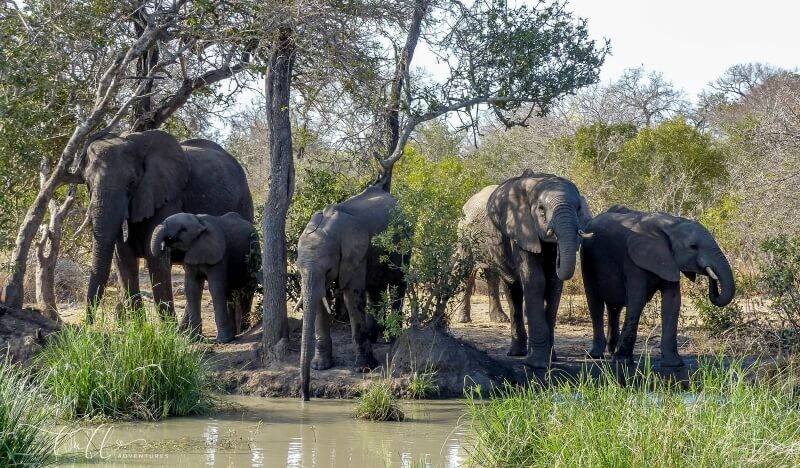 Ethical Wildlife Tourism: A happy group of tourists observing elephants from a safe distance, demonstrating respect for the animals' natural habitat.
Ethical Wildlife Tourism: A happy group of tourists observing elephants from a safe distance, demonstrating respect for the animals' natural habitat.
3. What Key Factors Determine if Animal Tourism is Ethical?
Several factors determine whether animal tourism is ethical:
- Animal Welfare: The activity should prioritize the physical and psychological well-being of the animals involved.
- Conservation Impact: The tourism activity should contribute to the conservation of the species and their habitat.
- Community Benefits: Local communities should benefit economically from the tourism activity.
- Education: Tourists should be educated about the animals and their conservation needs.
- Regulation: The activity should be regulated and monitored to ensure adherence to ethical standards.
These factors align with the principles of responsible travel, which, according to the United Nations Environment Programme, includes “minimizing negative environmental, social, and economic impacts” and “generating greater economic benefits for local people.”
4. What Role Do the Five Freedoms Play in Ethical Animal Tourism?
The Five Freedoms of Animal Welfare are fundamental to ethical animal tourism. They provide a framework for assessing the welfare of animals in captivity and in the wild. Ensuring these freedoms are met is essential for responsible animal tourism.
Ruth Harrison’s groundbreaking work, Animal Machines, highlighted the importance of these freedoms and led to their widespread adoption. The Five Freedoms are not just a set of guidelines but a moral imperative for ensuring the welfare of animals in tourism and other industries.
5. How Can Tourists Ensure They Are Participating in Ethical Animal Tourism?
Tourists can take several steps to ensure they are participating in ethical animal tourism:
- Research: Research the animal activity and the organization offering it thoroughly.
- Read Reviews: Check reviews on sites like TripAdvisor, looking for comments about animal welfare.
- Choose Accredited Organizations: Book through organizations that focus on ethical animal tourism, such as Airbnb Animal Experiences or Natural Habitat Adventures.
- Look for Accreditation: Check if the sanctuary or facility is accredited by the Global Federation of Animal Sanctuaries.
- Observe Animal Behavior: Observe the animals to ensure they appear healthy, stress-free, and able to express natural behaviors.
SIXT.VN is committed to promoting ethical animal tourism. You can contact us at Hotline/Whatsapp: +84 986 244 358 or visit our website SIXT.VN for assistance.
6. What Are Some Ethical Safari Practices in Africa?
Ethical safaris in Africa allow tourists to observe animals responsibly in their natural habitat. Key practices include:
- Maintaining Distance: Don’t crowd the animals or disrupt their natural behavior.
- Using Red Light Filters: Use red light filters on spotlights during night game drives to avoid blinding the animals.
- Following Guidelines: Adhere to common-sense guidelines, such as not getting out of the vehicle or making loud noises.
- Avoiding Baiting: Don’t support safari lodges that use bait to draw animals to the camp.
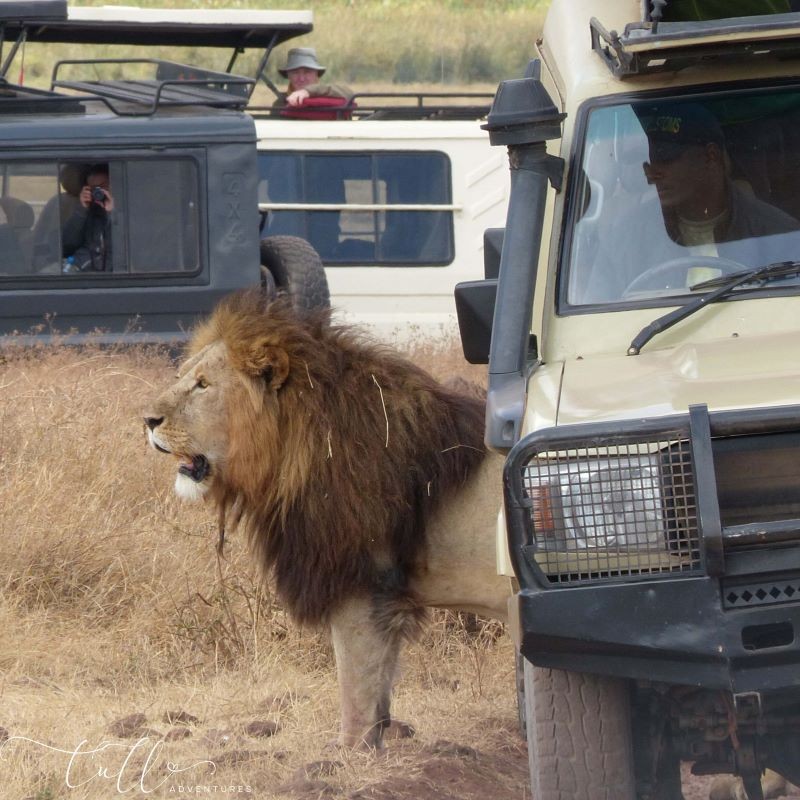 Ethical Safari: A pride of lions observed from a distance by tourists in safari vehicles, ensuring minimal disturbance to their natural activities.
Ethical Safari: A pride of lions observed from a distance by tourists in safari vehicles, ensuring minimal disturbance to their natural activities.
7. How Do National Parks and Wildlife Reserves Promote Ethical Animal Tourism?
National parks and wildlife reserves play a crucial role in promoting ethical animal tourism by:
- Restricting Access: Limiting access to popular parks to allow wildlife time and space to live natural lives.
- Providing Guidelines: Offering guidelines for wildlife observation and safety, such as maintaining a minimum distance from animals.
- Enforcing Regulations: Enforcing regulations against feeding, touching, teasing, or intentionally disturbing wildlife.
- Managing Waste: Ensuring proper storage of food and disposal of trash to prevent animals from becoming dependent on humans.
The U.S. National Park Service has comprehensive guidelines that serve as a model for ethical wildlife observation worldwide, emphasizing the importance of respecting wildlife and their habitats.
8. How Can We Identify Ethical Captive Animal Attractions?
When visiting captive animal facilities, consider the following to determine if they are ethical:
- Animal Health: Does the animal look like it’s receiving good nutrition? Does it seem healthy and free from stress?
- Natural Behavior: Is it behaving in a way you’d expect in nature?
- Enclosure Design: Is the enclosure similar to the animal’s natural habitat? Does it allow the animal to get privacy if it wants it?
- Organizational Structure: Who is benefiting from the program? Non-profit, educational facilities are more likely to prioritize the welfare of the animals.
According to the World Association of Zoos and Aquariums (WAZA), ethical zoos should be committed to conservation, research, and education, prioritizing the welfare of their animals.
9. Are Zoos Inherently Ethical Animal Tourism Examples?
Not all zoos are ethical. Some zoos house animals in cages without basic needs. However, many zoos follow the Five Freedoms and do important work on animal conservation. Well-run, responsible zoos provide an essential service in educating people to the value of wildlife. Ethical zoos actively engage in conservation efforts, such as breeding programs for endangered species, and contribute to scientific research.
SIXT.VN supports initiatives that promote animal conservation and education, aligning with the principles of responsible tourism.
10. What Are Notable Ethical Animal Tourism Examples Around the World?
Several organizations and destinations exemplify ethical animal tourism:
- Sheldrick Wildlife Trust (Nairobi, Kenya): Renowned for its work with orphan elephants, successfully reintroducing them to the wild.
- Whale Watching Tours (New England, USA): Accredited tour operators follow NOAA guidelines to ensure responsible observation of marine animals.
- Gorilla Trekking (Rwanda and Uganda): Tightly regulated programs that contribute to the conservation of mountain gorillas and support local communities.
These examples demonstrate that ethical animal tourism can have a significant positive impact on both animal welfare and conservation efforts.
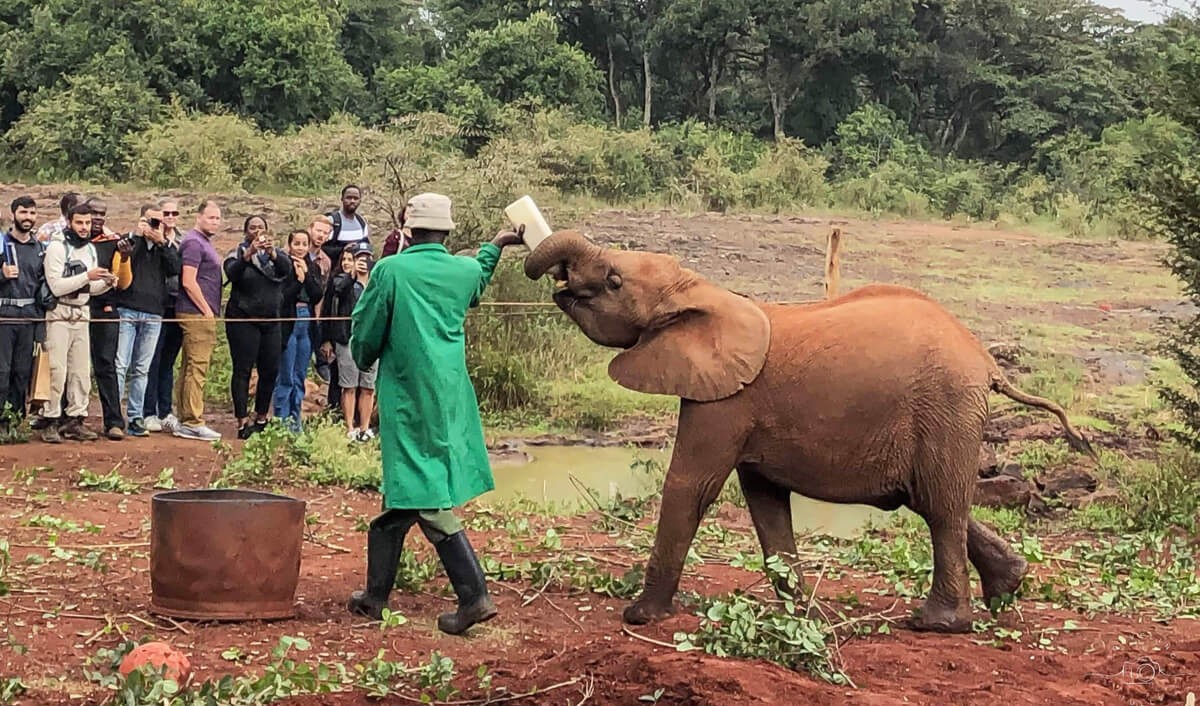 Ethical Animal Tourism: Tourists observing playful elephants at the Sheldrick Wildlife Trust in Nairobi, Kenya, an organization dedicated to elephant conservation.
Ethical Animal Tourism: Tourists observing playful elephants at the Sheldrick Wildlife Trust in Nairobi, Kenya, an organization dedicated to elephant conservation.
10.1. Sheldrick Wildlife Trust: A Beacon of Ethical Animal Tourism
The Sheldrick Wildlife Trust stands as a prime example of ethical animal tourism. Founded by Dame Daphne Sheldrick and her husband David, this organization has been dedicated to elephant conservation since the 1950s. Their pioneering work in hand-rearing orphan elephants has set a global standard for wildlife rehabilitation.
Ethical Practices:
- Orphan Elephant Rescue: The trust rescues and rehabilitates orphan elephants, providing them with the care they need to survive.
- Reintroduction to the Wild: The ultimate goal is to reintroduce these elephants back into the wild, allowing them to live free and natural lives.
- Anti-Poaching Patrols: The trust actively combats poaching, protecting elephants and other wildlife from illegal hunting.
- Veterinary Services: The trust provides veterinary care to injured animals in the park, ensuring their health and well-being.
- Community Engagement: The trust supports local communities by providing employment opportunities and promoting conservation awareness.
Visiting the Sheldrick Wildlife Trust:
- Elephant Orphanage: Tourists can visit the elephant orphanage in Nairobi, Kenya, and learn about the trust’s work.
- Safari Camps: The trust has recently opened safari camps in Kenya where travelers can stay and observe the older orphans.
Impact:
The Sheldrick Wildlife Trust has had a remarkable impact on elephant conservation in Africa. Their efforts have saved countless elephants and contributed to the preservation of their habitat. By visiting and supporting the trust, tourists can make a positive contribution to wildlife conservation.
10.2. Whale Watching: Ethical Encounters in the Deep Blue
Whale watching is a popular tourist activity that, when done ethically, can provide unforgettable experiences while supporting marine conservation. In the U.S., the National Oceanographic and Atmospheric Administration (NOAA) has developed guidelines for responsible whale watching.
Ethical Practices:
- Maintaining Distance: Tour operators must maintain a safe distance from whales to avoid disturbing their natural behavior.
- Avoiding Harassment: It is illegal to harass, feed, or swim with whales.
- Following Guidelines: Tour operators must follow specific guidelines to ensure the safety of both whales and tourists.
- Education: Tour operators should educate tourists about whales and their conservation needs.
Whale Watching Destinations:
- New England, USA: Cape Cod in Massachusetts is a prime feeding area for whales, offering excellent whale watching opportunities.
- Other Locations: Many other locations around the world offer ethical whale watching tours, including Iceland, Australia, and South Africa.
Impact:
Ethical whale watching can contribute to marine conservation by raising awareness about whales and their habitat. It can also provide economic benefits to local communities, supporting sustainable tourism.
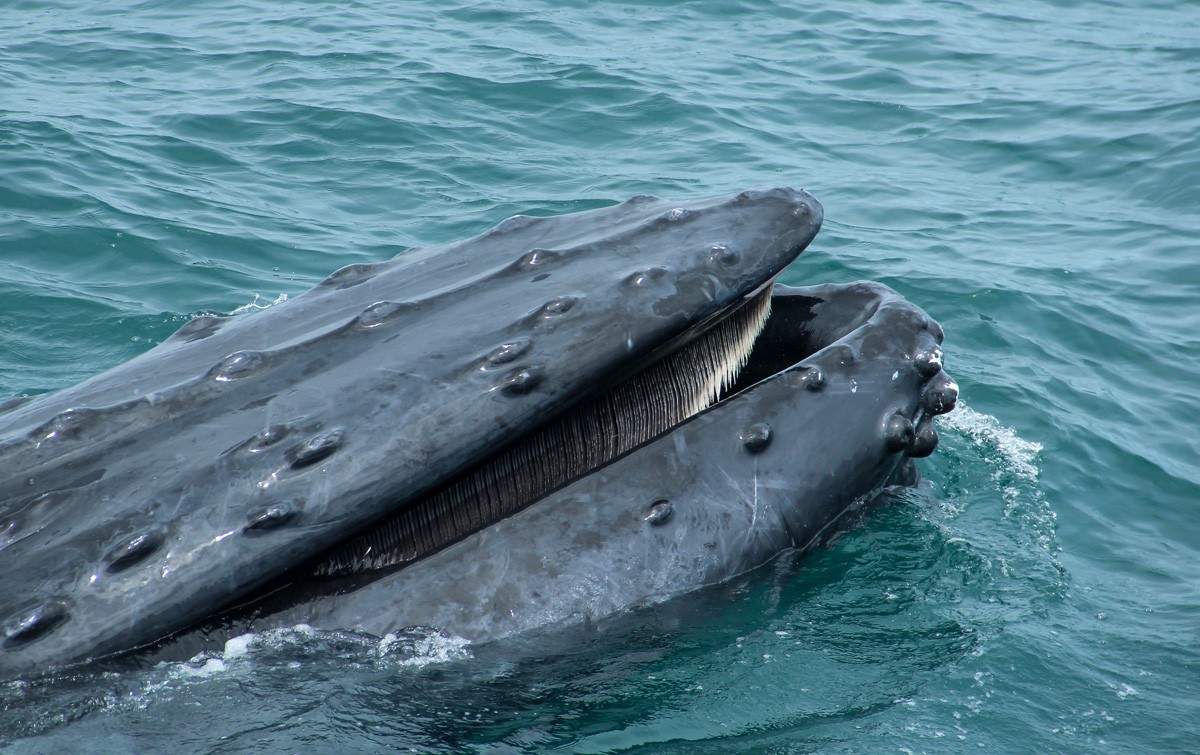 Ethical Whale Watching: Tourists observing a humpback whale from a boat, maintaining a respectful distance to avoid disturbing the animal.
Ethical Whale Watching: Tourists observing a humpback whale from a boat, maintaining a respectful distance to avoid disturbing the animal.
10.3. Gorilla Trekking: Conservation Through Tourism
Gorilla trekking in Rwanda and Uganda is a prime example of ethical animal tourism that has made a significant difference for both the animals and the local communities. When Dian Fossey was studying mountain gorillas in the 1960s, there were fewer than 250 animals left in the wild. Her work inspired the creation of parks in both Rwanda and Uganda with the goal of establishing ethical wildlife tourism.
Ethical Practices:
- Limited Numbers: The programs are expensive, tightly run, and limited in number, so that the gorillas can live their lives mostly undisturbed.
- Expert Guides: Trained guides lead small groups of tourists through the forest, ensuring minimal disturbance to the gorillas.
- Conservation Fees: A significant portion of the fees goes directly to gorilla conservation efforts, including anti-poaching patrols and habitat protection.
- Community Benefits: Funds from the programs have brought prosperity to these areas with money for schools, clinics, etc.
Destinations:
- Volcanoes National Park (Rwanda): This park is a prime gorilla trekking site, offering a unique opportunity to observe mountain gorillas in their natural habitat.
- Bwindi Impenetrable National Park (Uganda): This park is another important gorilla trekking destination, home to a significant population of mountain gorillas.
Impact:
Gorilla trekking has played a crucial role in the conservation of mountain gorillas. There are now over 1000 mountain gorillas living in the parks, a testament to the success of these conservation efforts.
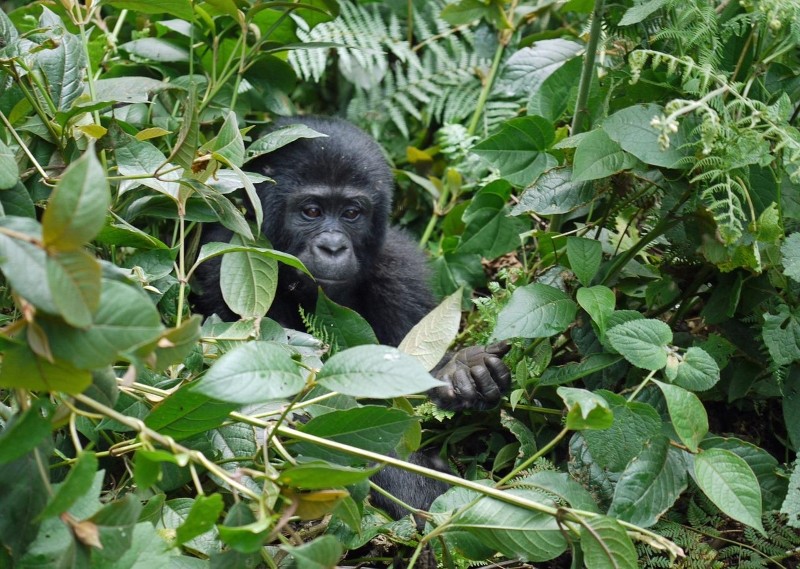 Ethical Animal Tourism: A young gorilla observed by tourists during a gorilla trek in Rwanda or Uganda, showcasing responsible wildlife tourism.
Ethical Animal Tourism: A young gorilla observed by tourists during a gorilla trek in Rwanda or Uganda, showcasing responsible wildlife tourism.
11. What Activities Should Be Avoided in Animal Tourism?
Certain activities should be avoided as they are often unethical and harmful to animals:
- Holding or Touching Wild Animals: This can stress or harm the animal.
- Feeding Wild Animals: This acclimates the animal to associating humans with food, often with tragic results.
- Riding Animals: Many animals used for rides are abused and forced to carry more than is safe for them.
- Crowding Animals: Getting too close to animals can disrupt their natural behavior and cause stress.
- Taking Selfies with Wild Animals: This often involves young animals poached from their mothers or medicated animals.
The World Animal Protection organization estimates that over 110 million people visit unethical tourist attractions every year, highlighting the need for greater awareness and responsible travel choices.
12. How Can We Report Unethical Animal Tourism Practices?
If you witness unethical animal tourism practices, you can take the following steps:
- Review the Program: Post a review on a travel site like TripAdvisor, identifying the issues.
- Report to Local Authorities: Report the activity to a local animal welfare organization or authority.
- Contact Advocacy Groups: Contact animal protection organizations like PETA for guidance on reporting.
By reporting unethical practices, you can help put pressure on the program to correct the problems or close down, contributing to the protection of animals.
SIXT.VN is committed to promoting ethical and responsible tourism. Contact us for guidance on planning your trip to Vietnam at Address: 260 Cau Giay, Hanoi, Vietnam. Hotline/Whatsapp: +84 986 244 358. Website: SIXT.VN.
13. What Are Some Additional Resources for Learning About Ethical Animal Tourism?
Several resources provide valuable information about ethical animal tourism:
- National Geographic: “Suffering Unseen: the dark truth behind wildlife tourism”
- World Animal Protection: “Elephants. Not Commodities”
- Global Federation of Animal Sanctuaries: Accredits sanctuaries as humane.
These resources can help you make informed decisions about your travel plans and ensure that you are supporting ethical animal tourism practices.
14. What is SIXT.VN’s Role in Promoting Ethical Animal Tourism in Vietnam?
SIXT.VN is committed to promoting ethical and sustainable tourism in Vietnam. We strive to offer services that align with the principles of responsible travel, ensuring the welfare of animals and the protection of their natural habitats.
Our Commitment:
- Promoting Ethical Tours: We partner with tour operators who adhere to ethical standards, ensuring that animal encounters are conducted responsibly.
- Supporting Conservation Efforts: We support local conservation organizations that work to protect wildlife and their habitats.
- Educating Tourists: We provide information to tourists about ethical animal tourism practices, helping them make informed decisions.
Services Offered:
- Airport Transfer: SIXT.VN offers convenient and reliable airport transfer services, ensuring a smooth arrival and departure for tourists.
- Convenience: Pre-booked transportation eliminates the stress of finding a ride upon arrival.
- Reliability: Professional drivers ensure timely and safe transportation.
- Comfort: Comfortable vehicles provide a relaxing start or end to your journey.
- Hotel Booking: We can assist with booking hotels that prioritize sustainability and ethical practices.
- Wide Selection: Choose from a variety of hotels that meet your budget and preferences.
- Convenience: Easy online booking process.
- Customer Support: Dedicated support team to assist with any inquiries.
- Tour Packages: Our tour packages are designed to promote responsible travel, including visits to ethical animal sanctuaries and wildlife reserves.
- Curated Experiences: Expertly designed tours that showcase the best of Vietnam.
- Local Guides: Knowledgeable guides who provide insights into the local culture and environment.
- Sustainable Practices: Tours that minimize environmental impact and support local communities.
By choosing SIXT.VN, you can ensure that your trip to Vietnam is not only memorable but also contributes to the well-being of animals and the preservation of their natural habitats.
15. What are the Benefits of Choosing Ethical Animal Tourism?
Choosing ethical animal tourism provides numerous benefits:
- Animal Welfare: Ensures the well-being of animals and protects them from exploitation.
- Conservation: Contributes to the conservation of endangered species and their habitats.
- Community Support: Supports local communities through economic opportunities and sustainable development.
- Education: Provides tourists with valuable knowledge about animals and their conservation needs.
- Ethical Travel: Aligns with the principles of responsible and sustainable tourism.
By making conscious choices, tourists can help create a more ethical and sustainable tourism industry that benefits both animals and humans.
16. How Does SIXT.VN Ensure the Quality and Ethics of Its Services?
SIXT.VN is committed to maintaining high standards of quality and ethics in all our services. We implement the following measures:
- Partner Selection: We carefully select our partners, ensuring they adhere to ethical and sustainable practices.
- Training and Education: We provide training to our staff and partners on responsible tourism practices.
- Monitoring and Evaluation: We continuously monitor and evaluate our services to ensure they meet our standards.
- Customer Feedback: We encourage customer feedback to help us improve our services and address any concerns.
Our goal is to provide tourists with exceptional experiences that are both enjoyable and ethical, contributing to the sustainable development of Vietnam’s tourism industry.
17. What Specific Animal Tourism Opportunities are Available in Vietnam Through SIXT.VN?
While Vietnam may not be as widely known for large-scale wildlife tourism as Africa or South America, there are still opportunities to engage in ethical animal tourism experiences:
- Endangered Primate Rescue Center (EPRC) in Cuc Phuong National Park: This center focuses on rescuing, rehabilitating, and releasing endangered primates, including langurs and gibbons. Visiting the EPRC can be an educational experience, although direct interaction with the animals is limited to ensure their well-being.
- Bear Bile Rescue Centers: Organizations like Animals Asia operate rescue centers for bears that were previously held in bile farms. While not a traditional tourism experience, visiting these centers can raise awareness about animal welfare issues and support conservation efforts.
- Birdwatching Tours: Vietnam is home to a diverse range of bird species, and birdwatching tours can be a low-impact way to appreciate the country’s wildlife. These tours often support local communities and promote conservation.
SIXT.VN can help you arrange transportation and accommodations for these types of experiences, ensuring that you are supporting ethical and responsible tourism practices.
18. What Advice Does SIXT.VN Offer for First-Time Visitors to Vietnam Interested in Animal Tourism?
For first-time visitors to Vietnam interested in animal tourism, SIXT.VN offers the following advice:
- Research Thoroughly: Before engaging in any animal-related activity, research the organization or tour operator to ensure they are committed to ethical practices.
- Prioritize Animal Welfare: Choose activities that prioritize the well-being of the animals, avoiding those that involve direct interaction or exploitation.
- Support Local Communities: Opt for tours and experiences that benefit local communities and promote conservation efforts.
- Be Respectful: When observing wildlife, maintain a respectful distance and avoid disturbing their natural behavior.
- Ask Questions: Don’t hesitate to ask questions about the organization’s practices and policies to ensure they align with your values.
By following these guidelines, you can have a meaningful and responsible animal tourism experience in Vietnam.
19. How Can Tourists Stay Updated on Ethical Animal Tourism Practices and Guidelines?
Staying updated on ethical animal tourism practices and guidelines is essential for making informed travel decisions. Here are some ways to stay informed:
- Follow Reputable Organizations: Follow organizations like the World Animal Protection, the Global Federation of Animal Sanctuaries, and the Tourism Concern on social media and subscribe to their newsletters.
- Read Travel Blogs and Articles: Read travel blogs and articles that focus on ethical and sustainable tourism.
- Attend Webinars and Workshops: Attend webinars and workshops on responsible travel and animal welfare.
- Check Accreditation and Certifications: Look for accreditation and certifications from reputable organizations when choosing tour operators and accommodations.
- Engage with Local Communities: Engage with local communities to learn about their perspectives on animal tourism and conservation.
By staying informed, you can make responsible travel choices and contribute to the well-being of animals and the sustainable development of tourism.
20. How Does Ethical Animal Tourism Impact Local Economies?
Ethical animal tourism can have a significant positive impact on local economies by:
- Creating Employment Opportunities: Providing jobs for local guides, park rangers, and hospitality staff.
- Generating Revenue: Bringing in revenue through tourism fees, accommodations, and other services.
- Supporting Local Businesses: Promoting the growth of local businesses, such as restaurants and souvenir shops.
- Incentivizing Conservation: Encouraging local communities to protect wildlife and their habitats for the benefit of tourism.
When tourism is managed responsibly, it can be a powerful tool for economic development and conservation.
SIXT.VN is dedicated to supporting local economies through ethical and sustainable tourism practices, ensuring that our services benefit both tourists and the communities they visit.
Contact SIXT.VN today to start planning your ethical and unforgettable Vietnam adventure. Visit our website SIXT.VN or call us at Hotline/Whatsapp: +84 986 244 358.



